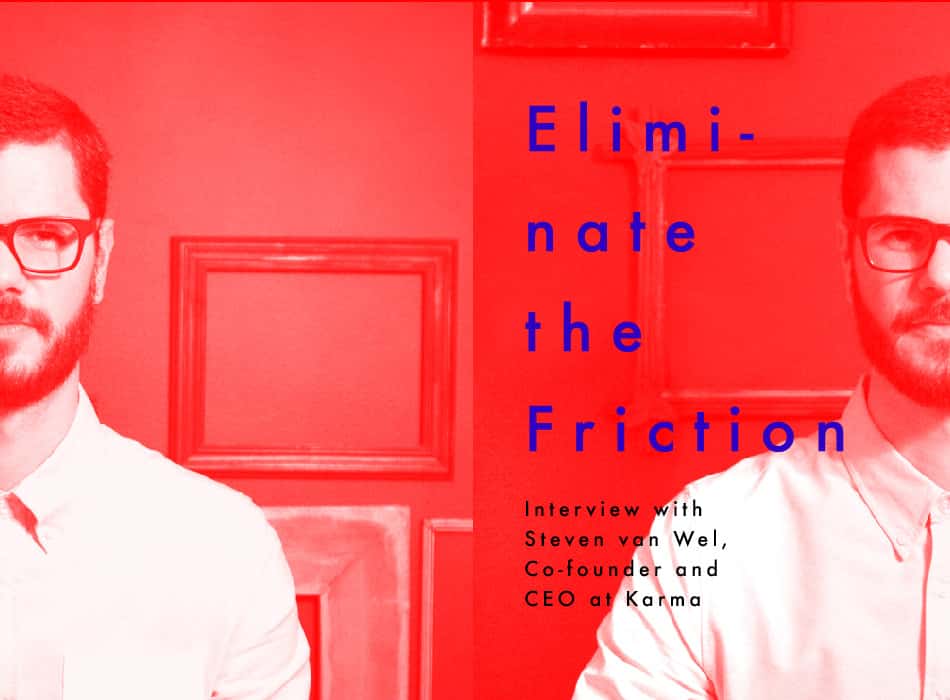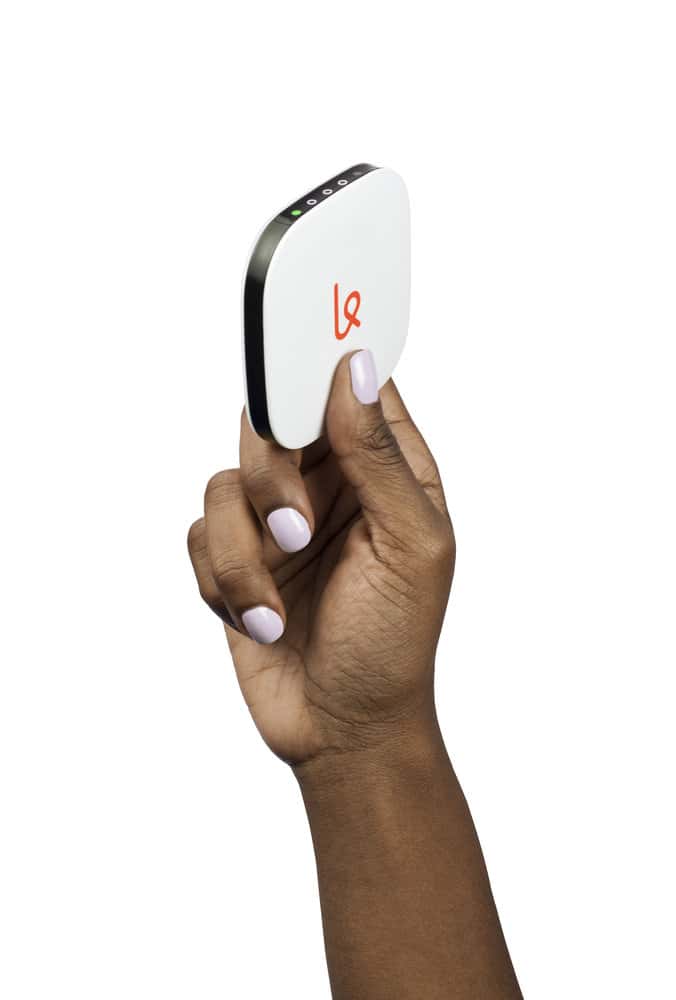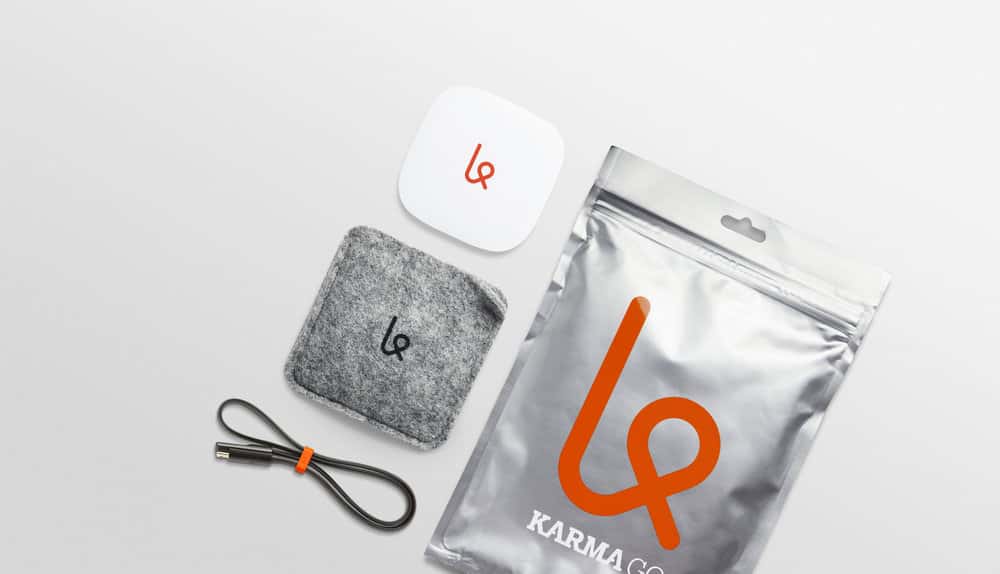Eliminate the Friction
This interview is part of the sixth issue of Featuring, a monthly newsletter on the intersection of business and culture. Sign up.

When life hands Steven van Wel a frustrating problem, he builds a startup.
This serial entrepreneur has a habit of tackling complex systems and convoluted processes head-on, and boiling them down to their essentials to arrive at a solution. This solution is often a new business.
It’s a process that has led Steven to co-found multiple startups—most recently Karma—a mobile provider that lets people take wifi with them wherever they go. Karma’s mission is simple: to make internet access on every device better than ever before.
We talked with Steven about what sparked the idea for Karma, how frustrations fuel some of his best ideas, and the future of wifi access around the world.
Tell me how Karma got its start.
I was traveling to New York in 2011 (a year before we started Karma) with a couple of friends from abroad, who are all startup founders. The moment we touched down at JFK, we had no good way to connect to the internet. We felt immediately disconnected—trying to get a cab, go to our hotel. I remember going to Best Buy, trying to find a solution, but it got more complicated the more questions I asked. There was really no easy solution for a non-U.S. citizen to get online while traveling.
My friends, Stefan Borsje and Robert Gaal, and I all started thinking about industries and companies that we’d really, really like to reinvent. Almost immediately, we all said, “mobile providers.”
Mobile providers deliver beautiful things: connectivity, but everything else is a bad experience—from going to a retail store, to trying to figure out your bill each month, and so on. We made a list of ten things that we would like to change and when we got to the end of the list, we thought, “These cellphone providers could really use some good karma.” That’s where we got the name for the company.

We launched Karma in January 2012, but the journey started with trying to bring a good product and user experience to an industry that has been stuck in the stone age for decades.
We saw data as the solution. We wanted to get people a connection to the internet, make it easy to share that connection to help others get online, and get out of the way. We also wanted to make that connection easy to share. I think that’s where most of the product actually found its origin—sharing connectivity with a group of people in the best way possible.
That’s fantastic. I know you’ve started a few companies in the past; What set you on this path of being an entrepreneur?
Mostly frustration. I like to simplify things, sometimes even oversimplify things.
My first business was a design agency that was a spinoff of an internship that I did at a larger agency, where I taught myself to code and build websites. Once I figured it out, I found a way to simplify it and started my first business around that.
The second one has a funny story. My co-founder of that first company and I were trying to move out of our parents’ places, but we both got stuck in the process of trying to get a mortgage. At some point we said, “How hard can it be to build our own house?” Long story short, seven years later we built an apartment complex of sixteen condos, sold fourteen of them. With the profit, we bought our own house and, after a couple of drinks, we decided to do that a few more times. Now have four apartment buildings in the city nearby Amsterdam that we built from the ground up.
It’s a similar story with Karma. We look at things that we’d like to achieve ourselves, whether that’s building websites, trying to move into a nicer place, or simply getting online, and use that frustration to how we can simplify the process and build a company around that.
How do you evaluate which of these frustrations to pursue as legitimate businesses?
Talk to people. Always try to figure out if others share in your frustration. At the end of the day, we want to transform that frustration into something that people are willing to pay for.
From day one at Karma, we decided to build a product that people would be happy to pay for. It was important to generate revenue, and I think the cost of a product often validates it. When people are willing to spend one or two dollars (or more) on a product you’re building from scratch, I think it creates a certain level of commitment for the product makers. You can’t just build something and stop maintaining it. As more people start to use it, you want to improve it because people are depending on it.
With Karma, what were some of your first steps?
The first step with Karma was to try to understand how to build hardware. We went to the same Best Buy as we did in 2011, where we initially had a really bad experience, and looked at all the devices that were available. We bought the best device we could find, took it apart, found the manufacturer, and sent them an email saying, “Can we buy 50,000 of these?”
To our surprise, they replied. Within 24 hours, we were having a conference call over Skype with our manufacturer in South Korea. Without a ton of research and without actually knowing what we were getting ourselves into, we found a way to use off-the-shelf hardware and customize it with our software and our design. Our two strongest focuses at the time were on design and experience, both which could be achieved through software. Along the way, we took more and more ownership of the development of both the hardware and the firmware, simplifying the product over and over again.
I think a big reason why Karma is successful is because we had absolutely no idea what we were doing. We weren’t restricted by knowledge. We weren’t restricted by previous rules that were set in place. We just wanted an easy way to get online. That also sets you apart from all the complexity that normal providers and normal hardware companies bring to the table because they have so much knowledge of how things are traditionally done.
I saw that your mission with Karma is to make internet access on every device better than ever before. How are you doing on that?
We aren’t reinventing the wheel. You’ve always been able to connect to wifi, but we want to create a product that works without any friction by getting rid of every unnecessary step. I think that helps us make the experience of getting online better than anything you’ve had in the past.
I think we’ll move closer and closer to a world where there is no divide between places that have internet and places without. If you think about when you go to a coffee shop, hotel, or even when you go to your rooftop, often there is no connectivity. We tend to have internet only in the places where we live the most. I have internet in my living room, I have internet at my office, but when I’m somewhere on a bridge, when I’m in a park—even when I’m at a friend’s place—I need to ask for the wifi password. I need to figure out how to get online.
I think that it is crucial to get rid of the question: “What is the password?” or “How do I get online?” It should just work. Within a decade, we want to completely blur the lines between mobile and home broadband. We would love people to be able to flip open their laptops, turn on their tablets, and immediately be connected.

I read that you use Karma products so religiously that you don’t even have an iPhone—and instead opt to use an iPod as your primary device. Are you still using that?
I switched to the latest iPhone because I really wanted to use Apple Pay and Touch ID. It still has no SIM card and I spend most of my time—as does my team—in airplane mode. Once you are connected to a Karma Go, you can bring your own wifi along with you wherever you go.
For example, with my Karma Go connection, right now I’m using Google Hangouts to talk to you, but I could also use any of the apps that I have on my phone. I have a Google Voice number and no one really notices the difference between me using an app or a regular phone number. It feels really amazing that after spending most of my life crying at the end of every month about the cost of my phone plan and SIM card—we’ve completely eliminated that. It’s a pretty amazing experience to be able to use your product nearly 24/7. You really begin to find the quirks and figure out how to improve it. I think the best way to experience that is to use your product religiously, whenever you can.
Definitely. You have to eat your own dogfood. The added bonus here being, of course, that it actually improves your ability to connect with others and get online wherever you happen to be.
We tend to like compare Karma with electricity. Wherever I am, I can plug in my laptop and plug in my phone charger, but sometimes I need an adapter. In a similar way, with Karma, you sometimes need to buy data, but once you do, it just works.
When I walk into a place, I should be able to open my laptop and watch Netflix. It sounds incredibly simple, but we’re still years away from that being reality. I hope that we’re doing a good job of bringing reliable connectivity to people to get them closer to that scenario.
On average, a Time Warner Cable subscription is over 80 dollars a month, but most people only use like 10 dollars worth of Internet. Karma Go also delivers a solution for folks that don’t want to spend 80 or 100 dollars for internet.
Do you see Karma Go as being a cost-effective alternative to existing internet providers?
It really depends on your data usage. If you look at how much the average household spends on data, say a married couple with one kid, at most three phones and home Internet, it’s definitely more than 250 dollars. My Karma bill has never been higher than 50 dollars a month. If your goal is to save, I would say that in the total lifespan of a Karma user, yes, you will definitely save money.
But, if you look at how we position the Karma Go, it’s not so much about trying to be the cheaper or faster solution, it’s really trying to be the best solution. You pick how you want to pay for data: with Refuel you pay as you go and it never expires and with Neverstop you pay one price every month and we don’t bug you .
As you see companies like Google launching Project Loon, what do you see as Karma’s role in bringing internet to places where there is none?
I’m so jealous of what Google is doing. There are over four billion people in the world without access to the internet, and it’s great to see companies like Google and Facebook bring connectivity to these places.
Right now, our product is purely based in the U.S and we don’t have any immediate plans to expand because there is still so much to improve here.e are thinking about ways that we can partner with inner city schools or charities to get kids online who need to do their homework and may not be able to do it from home. If there ends up being a way for us to team up with Google or Facebook and bring connectivity to the masses, I would be the first one to say yes.
How long you think it will be until everyone in the world has access to the internet?
I hope it happens in the next two decades. We recently published a white paper on what we think the future of connectivity will look like and the bottom line is that we believe ten years from now all internet access will be wireless. If you think about it, ten to fifteen years ago everything was wired. Now, we still run big internet cables into buildings, then split them among the apartments, and every individual turns it into a wifi signal.
If we can skip all these wired steps, it will save a tremendous amount of money on infrastructure and we can start to focus on bringing the cost of connectivity down to a point where which it’s affordable for everyone.
In an interview with Lifehacker, you once said: “I think the world could be different if we got away from mobile providers and eventually our ISPs. With Karma, I have one device to get me connected, and the data is mine.” Can you speak to that?
I think if we can make it so that data isn’t tied to one specific provider or one specific network—we can stop worry about where it comes from and focus on what we’d like to do with that data. Everyone should have access to data.
Right now, if we think about how we use devices and use this analogy of electricity again—if I plug my laptop charger into a power outlet, I don’t have to pay for that. When I walk into a different building and plug in, that building is paying for that. But it doesn’t really change the way I get online or how I charge my device.
Similarly, if I decide to bring my laptop online, or my iPad or phone, ideally, it shouldn’t matter where that data actually comes from. It could be any of the big providers. The only thing that really matters is the way that I pay for it or the way that I get charged.
Your mission also mentions ‘simple’ and ‘honest,’ which seems to be a common theme in Collaborative Fund’s portfolio. We hear a lot today about companies who pride themselves in their simple practices or transparency. How do you build those principles into the way you run Karma?
When we first started, we tried to work out a few principles that would be a part of everything that we do. Simple and honest were the two values that everyone agreed with. The product needs to be simple—simple to understand and simple to use. Everyone at Karma should be able to explain our products and our services with one sentence and, as we build our products, we have one rule: No fine print.

How can consumers hold companies accountable to that level of transparency?
That’s a really good question. We’re an online company. The only way to get Karma Go is on our website or from Amazon. I think the beautiful thing about being online is reviews.
The best way to hold companies accountable is to share exactly what your experience is as a customer. If that is a negative experience, tell the world. I think that might even be the simplest way, made possible by Amazon, to review companies publicly and tell your friends about your experiences.
That is one of the benefits of the internet, which I guess also comes with its fair share of detriments, too.
Exactly. When our product was delayed for a couple of months last year, we saw literally hundreds of negative comments stack up on a blog post that we published. But, when we started to communicate and include people in what was happening, explaining why we were delayed, those negative comments went down to nearly zero. In fact, they turned into hundreds of positive comments, mostly by the same people, because they saw progress and realized that we were being honest and transparent If you are a good company, a company that people love to talk about, a company that gives people a product that delivers, you will see those positive comments surpass the negative ones, almost overnight.
Do you have any other advice you would give to someone starting a company this year?
Do something that you feel really passionate about. If you build something for the sake of trying to make a quick buck or trying to sell your company, you will get bored after a couple of weeks, months, or years. If you look at Collaborative Fund’s portfolio, every founder has a personal story behind their company. We all want to make the world a better place, but each of us started with a frustration with the current status quo. The most passionate founders are the ones who are trying to solve a problem that they experienced themselves.
If you fix the right problems, then the simple question is: Can you find enough people that share in that problem with you? Who are willing to pay for your solution? Then you have a business.
